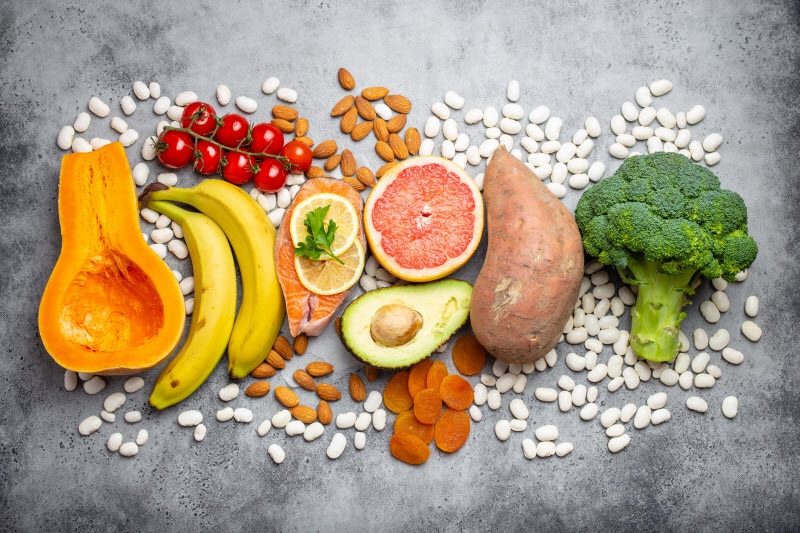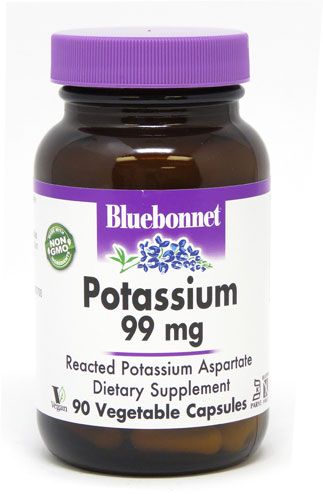[vc_row][vc_column][vc_column_text]Are you getting enough
potassium?
This mineral helps muscles contract and relax and is important in the transmission of nerve impulses. Low potassium levels may cause muscle weakness or pain, cramps and an irregular heartbeat.
However, the body does not make its own potassium, meaning you must look to outside sources to make sure you are getting enough.
"Potassium is an essential mineral that is not produced by the body and must be obtained through diet or supplementation," says Pam Hartnett, a registered dietitian nutritionist, nutrition writer and owner of
The Vitality Dietitians.

What is potassium?
Also known as an
electrolyte, potassium is a positively charged particle that can conduct electricity in water and other fluids, Hartnett says. When dissolved in water, electrolytes produce charged particles -- known as ions -- that conduct electrical currents.
Potassium moves freely in and out of cells, and plays a key role in maintaining the balance of electrically charged particles in and around your cells. This in turn helps your nerves and muscles function properly.
The mineral also plays a key role in
hydration and maintaining proper pH balance in your body.
"Potassium and sodium work together to maintain the fluid balance in the body," Hartnett says. "The balance of these two electrolytes is crucial for proper cellular function."
The many benefits of potassium
All tissues in the body require potassium. Its primary role is to regulate fluid levels inside the cell. It works together with sodium, which regulates fluid levels outside the cell.
Today, many people consume far too much sodium because they eat a lot of packaged and processed foods. This can cause your blood pressure to increase, leading to a great risk of heart disease and stroke.
Potassium helps lower blood pressure by relaxing the walls of blood vessels and moderating the effects of sodium, Hartnett says.
†
“It is important not to consume too much sodium because that may throw off the balance between sodium and potassium,” she adds.
Potassium also increases urine production and helps prevent the formation of calcium crystals in the kidneys, which reduces the risk of developing kidney stones.
†
The mineral also decreases calcium excretion and improves the absorption of calcium in the body, helping you maintain bone mass.
†
“This can help prevent osteoporosis and osteopenia,” Hartnett says. The former is a loss of bone mass, while the latter is a loss of bone mineral density.
†
How much potassium do you need?
The amount of potassium your body requires depends on age, gender and other factors, according to the
National Institutes of Health.
A 15-year-old girl might require 2,300 milligrams a day while a pregnant 30-year-old woman should get 2,900 milligrams.
For males, a 15-year-old boy might need 3,000 milligrams while a 30-year-old man requires 3,400 milligrams.
However, the above numbers are intended as recommended “adequate” intakes, which may or may not reflect optimal or ideal intakes, Hartnett says.
"Some individuals may need more potassium than others depending on their lifestyle and sodium intake," she says.
For example, those who consume an excessive amount of sodium -- which Harnett again cautions is "never a good idea" -- and people who regularly engage in intense physical activity may require more potassium.
By contrast, it is possible to boost your potassium intake to excessive amounts. "Consuming too much can be just as bad as consuming too little," Harnett says.
Excess consumption can cause hyperkalemia, a condition characterized by extremely high levels of potassium in the blood. Symptoms of hyperkalemia include muscle weakness, fatigue and irregular heartbeat.
Potassium also can be harmful to some people with kidney disease, says Amy Margulies, a registered dietitian nutritionist who calls herself “
The Rebellious RD.”
“When your kidneys aren’t working as they should, you may need to limit potassium in your diet,” she says.
She adds that some heart medications can cause potassium levels to increase to higher-than-desired levels.
“In such situations, your doctor may put you on a low-potassium diet that includes avoiding high-potassium foods," she says.
Although the precise amount of potassium people need varies, the average adult should aim for about 4,700 milligrams of potassium every day,
according to the American Heart Association.
How to increase your potassium intake
Those looking to get adequate potassium should follow a basic rule, Harnett says.
"The best way to increase potassium intake through diet is to lean toward a plant-based or pescatarian eating approach," she says.
Harnett say examples of potassium-rich foods include:
- Vegetables such as spinach, avocado, tomato, Brussels sprouts, broccoli, beets, potato and peas
- Fruits such as bananas, oranges, kiwi, peaches, apricots, cantaloupe and dried fruits including prunes
- Legumes such as lentils, kidney beans, chickpeas, and soybeans
- Nuts and seeds such as pistachios, almonds, walnuts, peanuts, sunflower seeds and pumpkin seeds
- Fish such as salmon, tuna and halibut
- Dairy products such as yogurt, milk, and cheese
The
potassium level of these foods varies. A single banana might have 451 milligrams of potassium, while a medium baked potato – including the skin – has 926 milligrams.
Harnett recommends including at least one serving of fruits or vegetables at every meal.
"Choose whole, fresh foods rather than processed foods, which are often low in potassium and high in sodium," she says.
Snack on nuts, seeds or fresh fruits instead of processed snacks. Also, try incorporating more plant-based proteins, such as legumes, into your diet.
Look for little ways to drop harmful foods and instead substitute more healthful, potassium-rich alternatives. "Use avocado as a substitute for mayonnaise or as a topping for salads or sandwiches," Harnett says.
She also notes that some cooking methods, such as boiling, can cause potassium to leach out of foods.
"To retain the potassium content of foods, try grilling, roasting or steaming instead of boiling," she says.
Just keep in mind that people with certain health conditions – such as kidney disease -- or who take some types of medication should not get too much potassium, Margulies says.
“Talk with your doctor about how much potassium is safe for you,” she says. “Also, check in with your doctor if you’re on ACE inhibitors, diuretics or beta-blockers, which may disrupt your body’s potassium balance.”
Also, Harnett reminds you to speak with a physician before taking potassium supplements.
“If you're considering taking potassium supplements, talk to a health care professional first to determine if it's necessary and the appropriate dosage,” she says.
†These statements have not been approved by the Food and Drug Administration. These products are not intended to diagnose, treat, cure or prevent disease.[/vc_column_text][/vc_column][/vc_row][vc_row][vc_column][vc_text_separator title="Featured Products" border_width="2"][vc_row_inner equal_height="yes" content_placement="middle" gap="35"][vc_column_inner width="1/3"][vc_single_image image="165741" img_size="full" alignment="center" onclick="custom_link" img_link_target="_blank" css=".vc_custom_1679575436419{padding-right: 7% !important;padding-left: 7% !important;}" link="https://www.vitacost.com/vitacost-potassium-citrate"][/vc_column_inner][vc_column_inner width="1/3"][vc_single_image image="165739" img_size="full" alignment="center" onclick="custom_link" img_link_target="_blank" css=".vc_custom_1679575451409{padding-right: 7% !important;padding-left: 7% !important;}" link="https://www.vitacost.com/crispy-green-crispy-fruit-4-pack-all-banana"][/vc_column_inner][vc_column_inner width="1/3"][vc_single_image image="165740" img_size="full" alignment="center" onclick="custom_link" img_link_target="_blank" css=".vc_custom_1679575470353{padding-right: 7% !important;padding-left: 7% !important;}" link="https://www.vitacost.com/twinlab-potassium-caps"][/vc_column_inner][/vc_row_inner][/vc_column][/vc_row]




